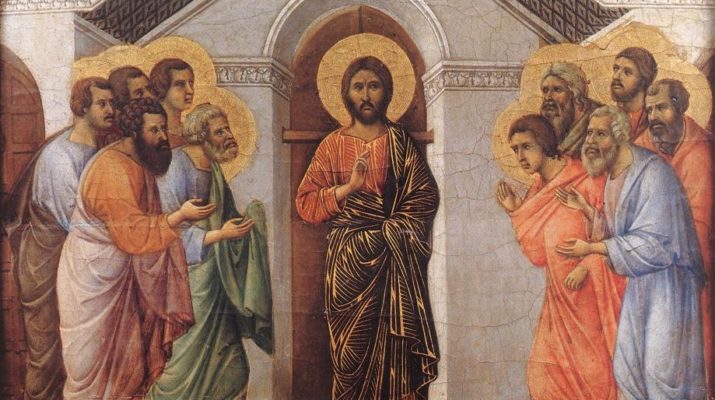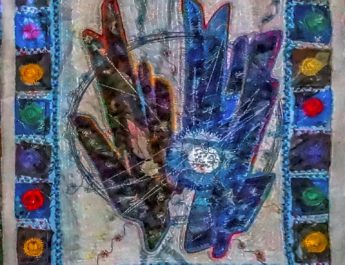Luke 24:36-43
Easter Tuesday – A Women’s Lectionary
36 While they were talking about this, Jesus himself stoodA among them and said to them, “PeaceB be with you.” 37 They wereC startledD and terrified,E
A “stood” = histemi. This is to stand, place, establish, appoint, stand ready, be steadfast.
B “peace” = eirene. Perhaps from eiro (to join, tie together to form a whole). This is one, peace, quietness, rest, peace of mind, harmony. Peace was a common farewell among Jews (i.e. shalom) and this well-wishing included a blessing of health and wholeness for the individual. This word also indicates wholeness and well-being – when everything that is essential is joined together properly. This is peace literally or figuratively. By implication, it is prosperity (but not in the sense of excessive wealth. Prosperity would have meant having enough from day to day.)
C “were” = ginomai. This is to come into being, to happen, become, be born. It can be to emerge from one state or condition to another or is coming into being with the sense of movement or growth.
D “startled” = ptoeo. 2x in NT – both in Luke. Perhaps related to pipto (to fall literally or figuratively) OR petomai (to fly). This is to scare, frighten, fill with panic, flutter. It is to scare someone so that the behave irrationally.
E “terrified” = emphobos. 5x in NT. From en (in, on, at, by, with) + phobos (panic flight, fear, fear being caused, terror, alarm, that which causes fear, reverence, respect); {from phebomai (to flee, withdraw, be put to flight)}. This is to be afraid, fully terrified.
and thoughtF that they were seeingG a ghost.H
F “thought” = dokeo. From dokos (opinion). This is to have an opinion, seem, appear, think, suppose. It deals with a personal judgment. This is the root of the word “doxology.”
G “seeing” = theoreo. From theaomai (to behold, look upon, see, contemplate, visit); from thaomai (to gaze at a spectacle; to look at or contemplate as a spectator; to interpret something in efforts to grasp its significance); from theoros (a spectator or envoy). This is gazing, beholding, experiencing, discerning. It is looking at something to analyze it and concentrate on what it means. This is the root of the word “theatre” in that people concentrate on the action of the play to understand its meaning.
H “ghost” = pneuma. From pneo (to blow, breath, breathe hard). This is wind, breath, or ghost. A breeze or a blast or air, a breath. Figuratively used for a spirit, the human soul or part of us that is rational. It is also used supernaturally for angels, demons, God, and the Holy Spirit. This is where pneumonia comes from.
38 He said to them, “Why are you frightened,I and why do doubtsJ ariseK in your hearts?L
I “frightened” = tarasso. 18x in NT. This is trouble, agitate, stir up. It is motion back and forth, creating inner turmoil or confusion, roiling water.
J “doubts” = dialogismos. 14x in NT. From dialogizomai (to consider, have a back and forth debate with an uncertain conclusion; multiple confused minds reinforcing a faulty conclusion); {from dia (through, because of, across, thoroughly) + logizmai (to compute or reckon up, to count; figuratively, it is coming to a conclusion or decision using logic; taking an inventory in a literal or figurative sense); {from logos (word, statement, speech, analogy; here, word as an account or accounting; can also be a word that carries an idea or expresses a thought, a saying; a person with a message or reasoning laid out in words; by implication, a topic, line of reasoning, or a motive; can be used for a divine utterance or as Word – Christ); from lego (to speak, tell, mention)}. This is reasoning, plotting, argument, discussion that reinforces faulty reasoning, debate.
K “arise” = anabaino. From ana (up, back, among, again, anew) + the same as basis (step, hence foot; a pace); {from baino (to walk, to go)}. This is to come up in a literal or figurative sense – ascent, rise, climb, enter.
L “hearts” = kardia. Literally the heart, but figuratively mind, character, inner self, will, intention, thoughts, feelings. Also, the center of something. The word heart is only used figuratively in the Old and New Testaments. This is where “cardiac” comes from.
39 LookM at my handsN and my feet; seeO that it is I myself.
M “look” = horao. To see, perceive, attend to, look upon, experience. Properly, to stare at and so implying clear discernment. This, by extension, would indicate attending to what was seen and learned. This is to see, often with a metaphorical sense. Can include inward spiritual seeing.
N “hands” = cheir. This is the hand in a literal sense. Figuratively, the hand is the means a person uses to accomplish things so it can also mean power, means, or instrument.
O “see” = horao. Same as “look” in v39. See note M above.
TouchP me and see;Q for a ghost does not have fleshR and bones as you seeS that I have.”
P “touch” = pselaphao. 4x in NT. Probably from psallo (to twang, play, sing psalms, pluck a stringed instrument such as a harp); {from psao (to rub)} + hapha (to handle). This is to touch, feel, or grope about. It is a light touch to explore, discover, or confirm something with physical contact. It can also figuratively mean search for.
Q “see” = horao. Same as “look” in v39. See note M above.
R “flesh” = sarx. May be from saroo (to sweep, cleanse by sweeping); from sairo (to brush off). This is flesh, the body, human nature, materiality, kindred. Flesh is not always evil in scripture (as when it refers to Jesus taking on a human body). However, it is generally used in a negative way for actions made selfishly and not through faith. This can mean animal flesh, i.e. meat, or refer to body in contrast to soul/spirit. Flesh can be a way of talking about how things or people are related or talking about human frailty (physical or moral).
S “see” = theoreo. Same as “seeing” in v37. See note G above.
40 And when he had said this, he showedT them his hands and his feet. 41 While in their joyU they were disbelievingV and still wondering,W he said to them, “Have you anything here to eat?”X
T “showed” = deiknumi. This is to show in a literal or figurative sense so it can be to teach, bring, or point out.
U “joy” = chara. From chairo (to rejoice, be glad or cheerful; a greeting); from char– (to extend favor, lean towards, be inclined to be favorable towards). This is joy, delight, gladness. Can be understood as the feeling you get when you are aware of grace.
V “disbelieving” = apisteo. 8x in NT. From apistos (unbelieving, incredulous, faithless; someone who rejects faith); {from a (not, without) + pistos (faithful, trustworthy, reliable, sure, or true; a fullness of faith); {from peitho (to have confidence, urge, be persuaded, agree, assure, believe, have confidence, trust)}}. This is to intentionally disbelieve, prove false. It can be one who has never believed or a believer who goes astray.
W “wondering” = thaumazo. Related to “seeing” in v37. From thauma (a wonder or marvel; used abstractly for wonderment or amazement; something that evokes emotional astonishment); may be from theaomai (see note G above). This is to marvel, wonder, or admire. To be amazed out of one’s senses or be awestruck. Being astonished and starting to contemplate what was beheld. This root is where the word “theatre” comes from.
X “eat” = brosimos. 1x in NT. From brosis (food or the act of eating; eating in a literal or figurative sense); from bibrosko (to eat). This is edible, meat.
42 They gaveY him a pieceZ of broiledAA fish,BB 43 and he took it and ateCC in their presence.DD
Y “gave” = epididomi. 9x in NT. From epi (on, upon, against, what is fitting) + didomi (give, offer, place, bestow, deliver; give in a literal or figurative sense). This is to deliver, give over, give up, surrender.
Z “piece” = meros. This is a part, a share, or a portion.
AA “broiled” = optos. 1x in NT. This is roasted or broiled.
BB “fish” = ichthus. This means fish. It was also an early, secret Christian symbol – the “sign of the fish.” It was short for “Jesus Christ, Son of God, Savior” in Greek. See https://en.wikipedia.org/wiki/Ichthys
CC “ate” = phago. This is to eat or figuratively to consume like rust does.
DD “in…presence” = enopion. From en (in, on, at, by with) + ops (eye, face); {from optanomai (to appear, be seen)}. This is literally “in the eye of” and is used for before or in the presence of.
Image credit: “Appearance Behind Locked Doors” by Duccio di Buoninsegna, between 1308 and 1311.




